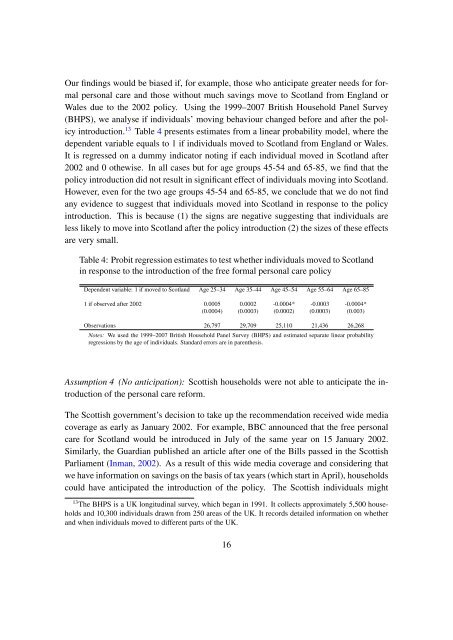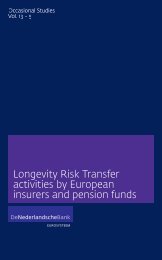dressing individuals
17&r=age
17&r=age
- No tags were found...
You also want an ePaper? Increase the reach of your titles
YUMPU automatically turns print PDFs into web optimized ePapers that Google loves.
Our findings would be biased if, for example, those who anticipate greater needs for formalpersonal care and those without much savings move to Scotland from England orWales due to the 2002 policy. Using the 1999–2007 British Household Panel Survey(BHPS), we analyse if <strong>individuals</strong>’ moving behaviour changed before and after the policyintroduction. 13 Table 4 presents estimates from a linear probability model, where thedependent variable equals to 1 if <strong>individuals</strong> moved to Scotland from England or Wales.It is regressed on a dummy indicator noting if each individual moved in Scotland after2002 and 0 othewise. In all cases but for age groups 45-54 and 65-85, we find that thepolicy introduction did not result in significant effect of <strong>individuals</strong> moving into Scotland.However, even for the two age groups 45-54 and 65-85, we conclude that we do not findany evidence to suggest that <strong>individuals</strong> moved into Scotland in response to the policyintroduction. This is because (1) the signs are negative suggesting that <strong>individuals</strong> areless likely to move into Scotland after the policy introduction (2) the sizes of these effectsare very small.Table 4: Probit regression estimates to test whether <strong>individuals</strong> moved to Scotlandin response to the introduction of the free formal personal care policyDependent variable: 1 if moved to Scotland Age 25–34 Age 35–44 Age 45–54 Age 55–64 Age 65–851 if observed after 2002 0.0005 0.0002 -0.0004* -0.0003 -0.0004*(0.0004) (0.0003) (0.0002) (0.0003) (0.003)Observations 26,797 29,709 25,110 21,436 26,268Notes: We used the 1999–2007 British Household Panel Survey (BHPS) and estimated separate linear probabilityregressions by the age of <strong>individuals</strong>. Standard errors are in parenthesis.Assumption 4 (No anticipation): Scottish households were not able to anticipate the introductionof the personal care reform.The Scottish government’s decision to take up the recommendation received wide mediacoverage as early as January 2002. For example, BBC announced that the free personalcare for Scotland would be introduced in July of the same year on 15 January 2002.Similarly, the Guardian published an article after one of the Bills passed in the ScottishParliament (Inman, 2002). As a result of this wide media coverage and considering thatwe have information on savings on the basis of tax years (which start in April), householdscould have anticipated the introduction of the policy. The Scottish <strong>individuals</strong> might13 The BHPS is a UK longitudinal survey, which began in 1991. It collects approximately 5,500 householdsand 10,300 <strong>individuals</strong> drawn from 250 areas of the UK. It records detailed information on whetherand when <strong>individuals</strong> moved to different parts of the UK.16




